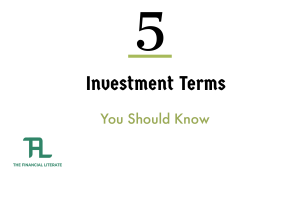
A finance professional, using the analogy of car driver, once said: you need not be an expert to start investing; you just need to know the basics and have the right map to move you from where you are to your financial goals (investment).
I keep saying it- investment is not as complex as some percieve it to be; just know the basics, keep learning and seek expert’s advice when need arises.
Below are, however, five investment terms you should acquaint yourself with in the journey of investment.
1. Investment Goals: This is the basis of your investment. It is very important that when you invest, you invest with a goal in mind; you know why you are investing. This helps you design the right personal investment plan (vehicle) to take you to your goals (destination). Your goals may differ from that of your friend so your ideal investment options may differ from your friend’s. Investment goals include: to earn passive income, to accumulate capital, for retirement and so on. These goals also have time horizons- short, medium or long term. Understanding your goals and their time horizons can guide you in what investment options you should be considering e.g. If you are investing short term, the money market is ideal for you. Options here includes mutual funds, treasury bills, commercial papers etc. If you are investing long term, then the stock market is good for you.
2. Risk and Return: The rule says that the higher the risk, the higher the expected returns and vice-versa. If you want high returns on your investment, you should also know that this calls for higher risk. You should know your risk tolerance level (the amount of risk you are “willing” and “able” to take).
Your willingness to take risks depends on psychological factors like your investment knowledge, experience and attitude to risks.
Your ability to take risks depends on situational factors such as your investment goals, time horizon, liquidity etc.
Low risk-takers can comfortably invest in money market instruments, investment deposits.
Medium risk-takers can go for medium risk options like Agritech, Micro-credit, Real Estate.
High risk-takers can go for the stock market.
To mitigate risks, diversification is key! A good mix of investment in the different risk levels is recommended.
3. Time horizon: This denotes the length of time by which you will hold a particular investment/asset. Time horizon in investment depends on your goals. If your goals are long term, then go for investment options with long-term horizon. With a long-term horizon option, an investor can take up riskier investment option as there would be enough time to gain back losses that occur during a market fall. This concept is a simple yet important concept in investing. You should be able to get your money back at the appropriate time for your goals.
4. Liquidity: Very closely related to time horizon is liquidity. Liquidity is the ease of converting an asset to cash or the ease of “buying” and “selling” a security without affecting its price. For those investing with a short-term horizon, liquidity is key for you and you should invest in options in which you can access your wealth easily and your asset’s value is preserved. You should plan your investment such that you have enough liquidity to meet your goals and financial needs.
5. Emergency Fund: While emergency fund is not fully an investment term, it is very important that before diving into the world of investment, you have a solid emergency fund. An emergency fund is a fund (safety net) to cover unexpected financial dilemmas and obligations such as home repairs, car breakdown, urgent medical bills or a worst case scenario- loss of a major source of income. This fund should not be confused with your investments or regular savings. This fund is strictly for emergencies. It gives you a sense of safety in the event of unexpected obligations and shields you from borrowing to meet up these obligations. Experts advice that your emergency fund should consist at least three to six months of your basic expenses.
It is very important that before you start investing, your emergency fund is solid. It will make no sense to invest long-term and be cash-strapped short-term. Before tying up so much in investment, ensure you have saved up enough for emergencies.
We believe in you!
To your financial independence and freedom


Thank you Pearlz.
You’re welcome Tobi!